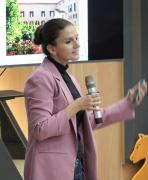
PAGANIZZA VALERIA
- Curriculum Vitae
- Office hour
- Teaching
- Appointments
- Research
Associate Professor of Agricultural and Food Law (GIUR-03/B) at the University of Parma, Department of Law, Political and International Studies, since October 1st, 2024.
After obtaining her Bachelor's degree in Juridical Sciences and her Master's degree in Law (2005) from the University of Ferrara (2008), both with a grade of 110L/110, she earned a PhD in European Union Law at the same institution, defending her thesis on the Rapid Alert System for Food and Feed (RASFF), in March 2013. She subsequently worked as a research fellow at the University of Eastern Piedmont (2014-2015) and the University of Modena and Reggio Emilia (2016-2017; 2019-2020). She was a researcher at the University of Padua, Department of Land, Environment, Agriculture, and Forestry (TESAF), from 2021 to 2024.
In addition to teaching at the University of Modena and Reggio Emilia (in both Italian and English), the University of Padua (in both Italian and English), and the Bologna Business School (in English), she taught courses in the Netherlands as a temporary lecturer (Wittenborg University of Applied Sciences, Apeldoorn) and guest lecturer (Wageningen University), in Australia (Monash University) and Germany (Justus Liebig University Giessen) through the Erasmus+ program. Since August 01st 2025, she is adjunct professor at Universitas Diponegoro, in Semarang (Indonesia).
Since 2014, she has been involved as a lecturer in training courses for the public and private sectors, advanced training programs, and post-graduate Master's programs in food law.
She is the author of two monographs: Bugs in law. Insetti e regole dai campi alla tavola, WKI, 2019 and Il sistema di allarme rapido per gli alimenti e i mangimi (RASFF). Comunicazione e collaborazione per la gesione del rischio, WKI-CEDAM, 2023, and co-author of Compendio di Diritto alimentare (2015, 2017, 2019, 2022, 2025 editions). She collaborated with Professors L. Costato and F. Albisinni in the direction of the Trattato breve di diritto agrario italiano e dell'Unione europea. Agricoltura, pesca, alimentazione e ambiente, CEDAM-WKI, 2023. She has authored publications in national and international journals and contributed to book chapters in the food law area.
Her research covers the entire field of food law, with particular focus on issues of innovation and sustainability, from field to table.
By appointment, students can meet Professor Paganizza in the following hours:
Monday 09-10
Tuesday 09-10
Wednesday 09-10
Thursday 09-10
Prof. Paganizza offers anyway maximum availability for meetings, either in person or via Teams, from Monday to Friday, by prior arrangement. It is always possible, however, to have a meeting before or after classes.
-
Course year: 1 - LLM - GLOBAL FOOD LAW: SUSTAINABILITY CHALLENGES AND INNOVATION - A.A. 2024/2025
Anno accademico di erogazione: 2025/2026
- Course year: 2 - First cycle degree (DM 270) - NATURAL AND ENVIRONMENTAL SCIENCES - A.Y.: 2024/2025
- Course year: 1 - Second cycle degree - GLOBAL FOOD LAW: SUSTAINABILITY CHALLENGES AND INNOVATION - A.Y.: 2025/2026
- Course year: 5 - Full cicle (5 years) - LAW - A.Y.: 2021/2022
- Course year: 2 - Second cycle degree - GLOBAL FOOD LAW: SUSTAINABILITY CHALLENGES AND INNOVATION - A.Y.: 2024/2025
Anno accademico di erogazione: 2024/2025
- Course year: 1 - Second cycle degree - GLOBAL FOOD LAW: SUSTAINABILITY CHALLENGES AND INNOVATION - A.Y.: 2024/2025
Professor/Teacher
- Second cycle degree GLOBAL FOOD LAW: SUSTAINABILITY CHALLENGES AND INNOVATION A.Y. 2025/2026
Teacher tutor
- Second cycle degree GLOBAL FOOD LAW: SUSTAINABILITY CHALLENGES AND INNOVATION A.Y. 2025/2026
Lines of research
Publications
-
Year: 2025Author/s: Costato Luigi, Borghi Paolo, Rizzioli Sebastiano, Paganizza Valeria, Salvi Laura
-
Year: 2025Author/s: Paganizza Valeria
-
Year: 2025Author/s: Paganizza Valeria
-
Year: 2025Author/s: Paganizza Valeria
-
Year: 2025Author/s: Paganizza Valeria
Orcid
Contacts
Via Università, 12
43121 PARMA
